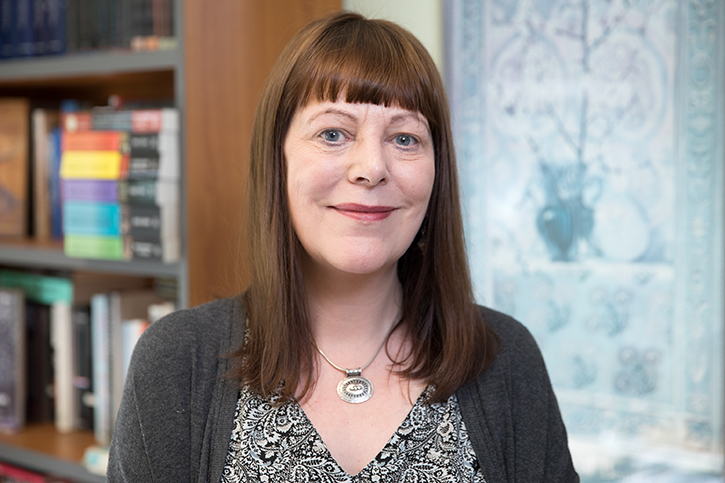- Home
- About the EDI Unit
- News & Events
- Publications
- EDI Training Hub
- Equality Committee
- Gender Identity and Expression
- Sexual Violence and Harassment Framework
- Speak Out
- University of Sanctuary
- Athena SWAN
Professor Lee Jenkins, School of English
Lee Jenkins, Professor of English

College: Arts, Celtic Studies & Social Sciences
School: English
Research Interests: Modernism, American & Carribean literature, & transnationalism
IRIS profile: http://publish.ucc.ie/researchprofiles/A014/ljenkins
What first attracted you to your academic discipline?
A love of reading, in the first instance. My interest in poetry (I am mainly a poetry critic) was triggered by reading Rimbaud and the Beat Generation poets when I was a teenager. My interest in American Literature came out of my longtime love for Bob Dylan's lyrics, I think. I enjoyed studying literature, especially poetry, at University: I went to New Hall, one of the two women's colleges at the University of Cambridge.
How were you drawn to your current research interests?
My most recent research has been on English writer D. H. Lawrence and his relationship to American Literature. I was drawn to the topic when a student asked me why Lawrence had written a book about American Literature. I didn't really have an answer. The research that led up to my last book, The American Lawrence (Florida, 2015), was an attempt to answer that question.
What professional achievements do you consider particularly rewarding?
I was delighted to be elected to the editorial board of The Wallace Stevens Journal: I wrote my PhD thesis on American poet Wallace Stevens, and my very first publication, in 1994, was an article in the Stevens Journal. I was also proud to be elected as associate editor of another excellent journal, The D. H. Lawrence Review. I found it highly rewarding to act as an external examiner at the University of Cambridge, where I studied for my BA and PhD degrees; I externed the MPhil programme in American Literature there, as well as acting as external examiner for five Cambridge PhDs over the years.
Have you had professional role models? What impact did they have on you?
My first professional role model was my PhD supervisor, Tony Tanner. He was a role model for me in writing, or trying to write, clear and lucid critical prose, and also in his exemplary interactions with his PhD students - he made you feel that your research was the centre of his attention, and I have tried to replicate his commitment with my own PhD supervisees. A number of women have been important professional role models for me: at Cambridge, these women included the remarkable scholar and activist Margot Heinemann, and Professor of American Literature, Jean Chothia, both of whom encouraged me to take up an academic career and acted as unoffical mentors. At UCC, Professor Emerita Patricia Coughlan was my professional role model, as she was, and is, for very many women working in academia in Ireland and beyond. Anne Fitzgerald, our School manager, is also a role model for me, and for my colleagues, both executive assistants and academic staff: Anne is a model of efficiency and also of collegiality, helping the rest of us to work as a team.
What aspects of your work do you find most rewarding?
I very much enjoy teaching, especially if I feel I have succeeded in conveying something of my own enthusiasm for modernist poetry and American Literature to my students. PhD supervision can also be immensely satisfying, and it's wonderful when PhD supervisees go on to successful academic careers themselves, becoming peers and colleagues rather than students. As Head of the School of English, it's immensely rewarding to lobby successfully for new posts and to support colleagues through the promotional process. It's rewarding too to be Head of a School which has a rich culture and strong tradition of postgraduate research and which has successfully fostered disciplines like Creative Writing, Film Studies, and Digital Humanities.
Any details you wish to share about how being female has impacted upon your career (positively or negatively)?
Childcare was an issue, both financially and in terms of time, at an earlier stage of my career. Other than that, during my time at UCC (23 years) I haven't felt that being female has impacted either negatively or positively on my career. I do think, however, that the increased number of women in senior positions now - in administration as well as in academic units - will impact positively on the careers of women at UCC, whether early-career academics or administrators.
Academic careers present specific challenges in achieving balance, whether between research, teaching and administration, or in work/life balance. What advice might you give a student/younger colleague/your 18-year old self?
The work-life balance is particularly hard for women to achieve, I think, but it isn't impossible. When you have very little time to think and write, you value that time all the more: I completed my first book during a sabbatical leave immediately after my second child was born. The balance between research, teaching and administration can also be hard to get right: my advice would be to avail of opportunites for regular sabbatical leave, and to try to keep a day each semester for research. Research-led teaching, where this is possible, can be generative for both research and teaching, meaning that there isn't an 'either/or' between the two. Administration can be time consuming, so my advice would be to alocate specific periods to admin tasks, so that you stay on top of these.
